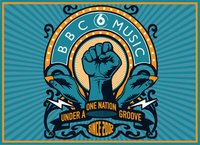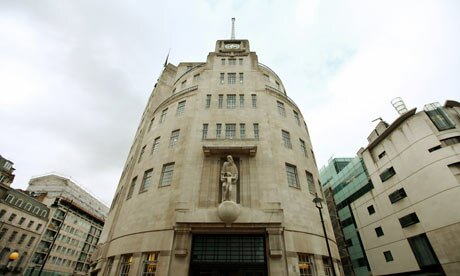The Revolution Is Just A Facebook Group Away
by Steve Mainprize

“And another demonstration passes on to history
Peace, bread, work, and freedom is the best we can achieve
And wearing badges is not enough in days like these”
- Billy Bragg, ‘Days Like These’
In the good old days – before the internet – there were two courses of action open to the ordinary person-in-the-street who wanted to complain about some disagreeable state of affairs. Firstly, they could write a stiff letter to a newspaper or their MP. Secondly, they could get some friends together and go on a march/start a riot.
What’s happening now on-line – what’s happened recently in causes such as the anti-Pop Idol campaign to wangle Rage Against The Machine’s Christmas number one* and the resistance to the threatened closure of BBC 6 Music – is that those two courses of action have blurred together. Now it’s relatively straightforward, given a sympathetic cause and a handful of online contacts, to assemble a mob, albeit a mob which, rather than marching on Whitehall for example, will all join the same Facebook group or put a logo on their Twitter avatars.
What I like about the old-fashioned options is that they both require you to put a bit of effort in. Even if you’re only going to write a letter, you need to marshal your thoughts, form a coherent argument and try to avoid wittering on too much. Then you need to gum a stamp on the envelope and actually get out of the house to go and post it. You actually have to show some commitment.
Similarly, to get a march going, you need co-ordinate plenty of like-minded people arriving at the same place at the same time, and you need to get banners and the appropriate permits and so forth sorted out beforehand, so there’s lots of organising to do. Riots may look easier to organise than marches, but remember that most riots actually start off as something more peaceful, so you’ve got all the administrative stuff at the start anyway, and then in addition you’ve got to worry about not being beaten up by whatever law-enforcement body your particular country dispatches to these events.
The problem with internet campaigns and Facebook groups and all the rest of it is that the cost – financial and personal – of taking part is practically nothing. You could even argue that the cost of entry is actually negative sometimes: there may be an advantage, beyond the cause itself, to joining “Save 6 Music”. I’m thinking of all those people who have “protested” via their office computers, as a displacement activity to avoid doing any actual work for another couple of minutes. I’m thinking about people joining just because their Facebook friend did. There’s also the phenomenon of people signing up to the cause not because they feel strongly about that cause specifically, but because it’s tangentially related to something they do feel strongly about. Here, I’m also thinking about people who never listen to 6 Music but wanted to get a bit bolshie because they love the BBC. I’m thinking about people who never listen to 6 Music but wanted to get a bit bolshie because they hate the BBC.

Ironic digression: having a lot of people in a Facebook group can generate as much press as a bunch of protesters waving banners in the street. This is because in recent times newspapers have had to cut costs to survive as their advertising income and sales revenue plummets, and consequently the few reporters that are left haven’t the time to research stories or even in some cases leave the office. So stories that they can pick up on-line are a godsend to them. (For a more detailed discussion of this, read the book “Flat Earth News” by Nick Davies http://www.flatearthnews.net/.) And to pile even more irony on top of that: why are advertising income and sales revenue dropping off? Because advertisers are diverting budgets to reach their target audience on the web, and because consumers increasingly get their news from online sources too.
It’s essentially free to add your name to an online campaign. But since it’s also free to not add your weight to the campaign, maybe we should be asking: what’s up with all the people who don’t sign up? 6 Music had a reach of 695,000 listeners in December, and the “Save 6 Music” group on Facebook has 168,000 members. What do the other 527,000 think? If we assume that each of the 168,000 Facebook members want to see 6 Music saved – for which the evidence is very weak – isn’t there an argument that the majority of the station’s listeners aren’t really that bothered? At best, they apparently aren’t bothered enough to spend a minute signing up to Facebook and clicking a button.
Yes, of course, I’m being deliberately obtuse. But when people can publicly voice their grievances so easily and cheaply, how are we meant to judge the true depth of feeling? The ease, cheapness and speed with which protesters can express dissent tends to lessen its weight, and hence its impact.
The other problem with almost-zero-cost protests is that, on the receiving end, it’s also almost-zero-cost to ignore the angry voices. If a thousand protesters turn up on your doorstep waving banners and shouting slogans at you though a megaphone, you tend to pay them some attention. If a thousand faxes arrive, or a thousand letters, then you may have to deal with the consequences of a broken fax machine, or a broken postman. But if you get a thousand emails complaining about the same thing, it’s a pretty quick job to set your spam filters to deal with them so that you don’t have to. If a thousand people sign up to a Facebook group, you don’t even have to notice.
It all seems terribly unfair on those people who really do feel strongly about an issue. In terms of pure numbers, their voice counts as much, or as little, as that of the merest button-clicking flibbertigibbet work-avoider. What those people need is to get back to the modes of protest that demonstrate more commitment. They need publicity-friendly stunts to attract news coverage, they need to be marching in the streets, waving banners and singing songs, and they need the support of large numbers of people.
The 6 Music protesters have realised this, and organised a Saturday lunchtime protest outside Broadcasting House. At the time of writing, the number of protesters is uncertain: reports range from five hundred to two thousand, and these are numbers given by the protesters themselves, rather than actual news agencies, which seem to have largely ignored the event. This is a shame, even if the subject matter under consideration makes it understandable.
But they need to stick to their guns. Keeping the momentum going until the BBC Trust publishes its interim conclusions in the summer will be difficult, and although their campaign has been largely successful so far, there will no doubt be setbacks.
The fact that people have actually made an effort to get out of the house and make a bit of noise is hugely encouraging. Hopefully this is a sign that real protest is alive and well, and that virtual protest is merely a starting point along the road to mobilising people to act in a just cause, whatever that might be. And beyond the survival or demise of a radio station, there might even be hope yet for protest of a more political hue.
* Wow, those words still don’t look right, do they?
Oomska’s Protest Playlist: http://open.spotify.com/user/mainy/playlist/5mtKK8d4fhnjtspEiccAOC
Pretty much exactly what I think about social media campaigning – very well balanced piece.
The numbers signing up to these groups often have the ‘wow’ factor, but usually it’ll only be a relatively tiny hardcore bunch actually appearing to engage in any kind of useful/relevant activity. 1 click does not a supporter make. Some will just be reticent about speaking up and bringing attention to themselves, but let’s be candid, many just aren’t that bothered either way.
However, they are hugely useful for gathering together those who ARE bothered – hence what happened on Saturday. I just hope we begin to see more ‘transference’ of this kind of approach going viral to all causes that matter – there’s no better enemy to injustice than committed people capable of organising you know what in a brewery.
Sadly getting news thru outlets such as six music who are unable to promote anti axeing protests is the way for a lot of radio six listening non facebookers…thus a lot of people missed out on saturday’s protest. I for one was definitely attending no matter what, but was under the impression it was happening on Mayday : (
The fact that the 527000 who havent joined the facebook protest havent joined the facebook protest means nothing in terms of guaging feeling, and for all the protests and petitions in the world, the one meaningful thing all lovers of six music can do, as stressed here by gideon coe is email thoughts to the BBC Trust.
There are some really good points in the article.Whether or not we can accurately guage the overall depth of feeling relating to saving six music, I hope the main focus regarding its future is on whether any individual believes it should be saved and what they can do to help save it. Exit polls are often inaccurate like weather forecasts. The Radio6 listener figures surely CANNOT be right. Maybe we will never know the truth, but we do know that we are being told positive feedback to the BBC Trust WILL make a difference in the overall decision.
In the meantime I am rethinking my non decision to not join up to facebook, which meant I missed out on last Saturday’s demonstration – How was it and which pub served all 510/700/1200 of you afterwards?